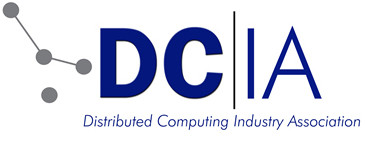In This Issue
- Help Recovery Efforts
- Equifax CFPB Battle
- Suffered Earlier Hack
- Report from the CEO
- W3C for HTML5 DRM
- Political Resistance
- CCLeaner Compromise
- SEC Systems Hacked
- Feds Up Cyber Hiring
- Build a New Internet
- Cloud Now a Standard
- Huge Change to AWS
- Intel Supports AI Dev
- GE Industrial Cloud
- Young GE Engineers
- Fog Industry Forecast
- Coming DCIA Events
Broadband Providers Help Hurricane Recovery Efforts
Excerpted from Morning Consult Report by Jonathan Spalter
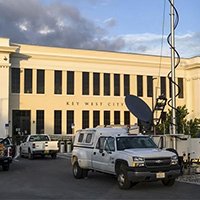 In times of crisis, it’s vitally important that people can communicate with loved ones and emergency responders.
In times of crisis, it’s vitally important that people can communicate with loved ones and emergency responders.
That need came into sharp focus again this week as Hurricane Maria bore down on Puerto Rico, as Hurricane Irma did just a few weeks ago in Florida, knocking out power to millions and leaving neighborhoods submerged or inaccessible because of blocked streets.
Natural disasters like Hurricanes Maria, Irma, and Harvey remind us about what’s important in life – family, faith, friends – and how easily the fabric of our lives and communities can be ripped apart when pounded by 130 mile-per-hour winds and several feet of water.
Communications networks in Puerto Rico and Florida were especially hard hit, thanks to an unforgiving combination of widespread power loss and standing water.
The three storms provided a stark reminder of how a natural disaster’s unique characteristics can affect an area’s recovery efforts.
Residents in Texas were able to get back online relatively quickly after Hurricane Harvey… Read More
Equifax Hack Renews CFPB Battle
Excerpted from Fox Business Report by Brittany De Lea
 In the wake of the Equifax breach, businesses, lawmakers, and individuals are grappling with the issue of protecting personal information – and for Congress, that could mean increased regulation and oversight.
In the wake of the Equifax breach, businesses, lawmakers, and individuals are grappling with the issue of protecting personal information – and for Congress, that could mean increased regulation and oversight.
“Typically the credit reporting agencies like Equifax don’t get the same kind of routine oversight as banks and financial institutions.
Generally nobody looks at them until something happens,” Scott Vernick, top privacy and cybersecurity expert at Fox Rothschild, told FOX Business.
“I don’t think anyone sort of stopped to think about the fact that you only have three credit reporting agencies and each of them holds about 200 million records.”
In addition to a congressional hearing, Vernick predicts both the Federal Trade Commission (FTC) and the Consumer Financial Protection Bureau (CFPB) will play a larger role in the oversight of credit reporting agencies moving forward, a transition that would potentially secure the future of the CFPB.
On Monday, a group of Democratic Senators wrote a letter to Equifax CEO Richard Smith about the company’s TrustedID… Read More
Equifax Also Suffered Earlier Hack
Excerpted from Bloomberg Report by Michael Riley, Anita Sharpe, and Jordan Robertson
 Equifax learned about a major breach of its computer systems in March – almost five months before the date it has publicly disclosed, according to three people familiar with the situation.
Equifax learned about a major breach of its computer systems in March – almost five months before the date it has publicly disclosed, according to three people familiar with the situation.
In a statement, the company said the March breach was not related to the hack that exposed the personal and financial data on 143 million US consumers, but one of the people said the breaches involve the same intruders.
Either way, the revelation that the 118-year-old credit-reporting agency suffered two major incidents in the span of a few months adds to a mounting crisis at the company, which is the subject of multiple investigations and announced the retirement of two of its top security executives on Friday.
Equifax hired the security firm Mandiant on both occasions and may have believed it had the initial breach under control, only to have to bring the investigators back when it detected suspicious activity again on July 29th, two of the people said.
Equifax hasn’t been transparent about the timing of the breach, Bloomberg’s Michael Riley says.
Equifax’s hiring of Mandiant the first time was unrelated to the July 29th incident, the company spokesperson said… Read More
Report from DCIA CEO Marty Lafferty
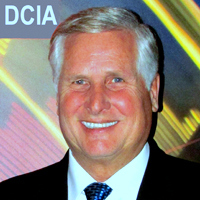
The World Wide Web Consortium (W3C), under the direction of internet inventor Tim Berners-Lee, this week issued new recommendations on protecting copyright in online audio and video content and improving the integrity of the internet of things (IoT).
Digital Rights Management (DRM), is central to the recommendations, which enables content rights holders to protect business models based on monetizing their intellectual property (IP) and preventing unauthorized access to their content, and also provides security for IoT devices and autonomous vehicles.
During the past four years, the W3C has been considering standardization of “Encrypted Media Extensions” (EME).
W3C’s new recommendations make it possible for DRM to be managed by browsers, in addition to the way they have been customarily managed by plugins.
This API standardizes DRM controls in browsers, giving publishers the ability to ensure their copyrighted material is protected from infringement by utilizing decryption components instead of plugins.
The Digital Millennium Copyright Act (DMCA) provides legal protection for DRM technologies, for example by outlawing disclosures of DRM vulnerabilities.
The decision was made by majority-vote at the W3C following vigorous debate of underlying issues, including whether or not to include a compromise provision, which was ultimately rejected, that would have protected researchers from DMCA prosecution.
W3C members Comcast, Microsoft, the Motion Picture Association of America (MPAA), Netflix, and the Recording Industry Association of America all praised the decision.
Integration of DRM into web browsers holds promise to deliver improved performance, battery life, reliability, security, and privacy to viewers.
And not being required to rely solely on third-party plugins should promote a safer and more reliable web. Share wisely, and take care.
HTML5 DRM Finally a W3C Recommendation
Excerpted from Ars Technica Report by Peter Bright
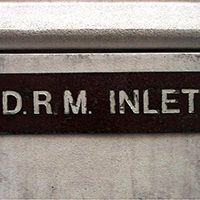 The World Wide Web Consortium (W3C), the industry body that oversees development of HTML and related web standards, has today published the Encrypted Media Extensions (EME) specification as a Recommendation, marking its final blessing as an official web standard.
The World Wide Web Consortium (W3C), the industry body that oversees development of HTML and related web standards, has today published the Encrypted Media Extensions (EME) specification as a Recommendation, marking its final blessing as an official web standard.
Final approval came after the W3C’s members voted 58.4 percent to approve the spec, 30.8 percent to oppose, with 10.8 percent abstaining.
EME provides a standard interface for DRM protection of media delivered through the browser.
EME is not itself a DRM scheme; rather, it defines how Web content can work with third-party Content Decryption Modules (CDMs) that handle the proprietary decryption and rights-management portion.
The development of EME has been contentious.
There are broad ideological and legal concerns; some groups, such as the Free Software Foundation, oppose any and all DRM in any context or application.
Some do not object to DRM, per se, but are concerned by regulations such as the US’ Digital Millennium Copyright Act (DMCA)… Read More
Internet Giants Face Political Resistance
Excerpted from NY Times Report by Cecilia Kang
 Last month, Facebook and Google came out forcefully against a bill that would hold companies accountable for hosting sex trafficking on their websites.
Last month, Facebook and Google came out forcefully against a bill that would hold companies accountable for hosting sex trafficking on their websites.
They said that while they worked hard to combat sex trafficking, changing the law “jeopardizes bedrock principles of a free and open internet” that have been crucial to innovation for decades.
By this week, the two companies were hoping to reach a compromise with lawmakers, an acknowledgment that they could not stop the bill entirely because of strong political headwinds.
The shifting position illustrates the changing political reality in Washington for some of the country’s biggest technology companies.
After years of largely avoiding regulation, businesses like Facebook, Google and Amazon are a focus of lawmakers, some of whom are criticizing the expanding power of big tech companies and their role in the 2016 election.
The attacks cover a smattering of issues as diverse as antitrust, privacy and public disclosure.
They also come from both sides, from people like Stephen K. Bannon, President Trump’s former chief strategist… Read More
Hackers Compromised CCleaner
Excerpted from Reuters Report by Joseph Menn
 Hackers broke into British company Piriform’s free software that optimizes computer performance last month, potentially allowing them to control the devices of millions of users, the company and independent researchers said on Monday.
Hackers broke into British company Piriform’s free software that optimizes computer performance last month, potentially allowing them to control the devices of millions of users, the company and independent researchers said on Monday.
More than 2 million people downloaded tainted versions of Piriform’s program, which then directed the computers to get instructions from servers under the hacker’s control, Piriform said.
Piriform said it worked with law enforcement and cut off communication to the servers before any malicious commands were detected.
This came after security researchers at Cisco Systems and Morphisec alerted Piriform’s parent Avast Software of the hack last week.
The malicious program was slipped into legitimate software called CCleaner, which cleans up junk programs and advertising cookies to speed up devices.
CCleaner is the main product made by London’s Piriform, which was bought in July by Prague-based Avast… Read More
SEC Corporate Filing System Attack
Excerpted from Report by Benjamin Bain and Matt Robinson
 Companies that took advantage of the chance to practice filing sensitive information with the US Securities and Exchange Commission might wish they hadn’t.
Companies that took advantage of the chance to practice filing sensitive information with the US Securities and Exchange Commission might wish they hadn’t.
While the SEC is providing few details, the regulator did say the hack of its online database of corporate filings targeted what the agency calls its test Edgar system.
It lets startups unfamiliar with filling out SEC forms get comfortable with the process without publicly blasting out market-moving announcements.
Now an initiative that was grounded in good intentions is causing the SEC headaches.
The agency disclosed Wednesday that not only had cybercriminals breached Edgar, but they may have stolen corporate secrets that they profited from.
The SEC blamed the 2016 intrusion – which it was slow to reveal – on a software vulnerability in its test system.
Edgar houses millions of filings on disclosures ranging from corporate earnings to statements on mergers and acquisitions… Read More
Feds Ramp-Up Cyber Hiring
Excerpted from The Hill Report by Morgan Chalfant
 The federal government will host the first-ever government-wide event to recruit new IT and cybersecurity talent, at a time when agencies and department are struggling to fill these positions.
The federal government will host the first-ever government-wide event to recruit new IT and cybersecurity talent, at a time when agencies and department are struggling to fill these positions.
The General Services Administration (GSA) on Thursday announced the event, which will be held November 6th-7th in Maryland.
The administration is looking to recruit computer scientists, cyber analysts, engineers, and others in order to “fill critical skills gaps” in top IT and cybersecurity roles across the federal government.
Multiple agencies and departments will be sending recruiters to the event in Silver Spring, MD, including the departments of Defense, Homeland Security, and Health and Human Services, as well as the Office of Personnel Management, senior administration officials told reporters Thursday.
Four intelligence agencies, including the FBI and NSA, will also participate, though applicants would need to apply directly with the intelligence agencies prior to the event in order to secure interviews.
Lawmakers on Capitol Hill have long spotlighted the challenge faced in recruiting and retaining tech and cyber personnel… Read More
Let’s Build a Whole New Internet
Excerpted from SiliconeRepublic Report by Luke Maxwell
 TSSG’s Miguel Ponce de Leon warns that the internet as we know it is not fit for purpose, and will crack at the seams when 5G comes along.
TSSG’s Miguel Ponce de Leon warns that the internet as we know it is not fit for purpose, and will crack at the seams when 5G comes along.
Miguel Ponce de Leon is part of an EU-wide research project called Pristine to develop Recursive InterNetwork Architecture (RINA), a computer network architecture that unifies distributed computing and telecoms.
De Leon believes that the current internet architecture, with broadband, mobile and Wi-Fi, is inefficient.
“Look, it is just not fit for purpose,” he explained.
“When you think about when the internet was designed originally back in the late 1960s, we never thought about mobility or security, which are huge issues that we see currently.
“We hear about 5G that it is going to be fabulous with all this quick activity.”
“But the core network is just not ready.”
“It needs to be replaced… Read More
Cloud Computing Becomes a Standard
Excerpted from Slovak Spectator Report by Peter Adomovsky
 A year ago many Slovak-based companies were still reluctant to give up possession of their data and move them to remote servers.
A year ago many Slovak-based companies were still reluctant to give up possession of their data and move them to remote servers.
Nowadays most of them take advantage of cloud computing not only for data storage but for various data management applications as well.
Cloud technologies have become generally accepted and customers can choose from a variety of global and local providers depending on their needs.
Cloud computing has come to be the standard even in such a conservative market like Slovakia, according to SAP solution specialist Jozef Suran.
“The strategy of moving into the cloud is becoming a more and more common part of the plans of small- and medium-sized companies,” Suran told The Slovak Spectator.
The transition to the cloud has accelerated thanks to the pressure of large global providers and gradual rejuvenation in managerial positions, said Viktor Meciar, Managing Director at the Tulip Solutions cloud outsourcing company… Read More
Huge Change to $12 Billion AWS Juggernaut
Excerpted from Business Insider Report by Matt Weinberger
 When Amazon launched Amazon Web Services (AWS) in 2006, it sparked a cloud computing revolution.
When Amazon launched Amazon Web Services (AWS) in 2006, it sparked a cloud computing revolution.
No longer would programmers have to buy, build, and maintain their own servers.
Now, developers could pay Amazon by the hour to access exactly the amount of supercomputing power they needed.
It totally changed the economics of building software, making it possible for a new breed of companies like Dropbox, Airbnb, and others to exist.
Now, Amazon is changing the game again, in a subtle but important way. Amazon EC2 — the prime computing engine at the core of Amazon Web Services — will begin to charge customers by the second rather than by the hour, the company said in a blog post.
The idea, Amazon said, is to reflect the more modern ways in which developers build apps today. For instance, in 2014, Amazon unveiled a new tool called Lambda, ushering in a trend called “serverless” computing.
To make a long story short, Lambda provides programmers with even more flexibility… Read More
Intel Cloud Platform Supports AI Development
Excerpted from Telecompaper Report
 Intel announced a new cloud computing platform to support industry development of artificial intelligence (AI) applications.
Intel announced a new cloud computing platform to support industry development of artificial intelligence (AI) applications.
The Intel Nervana DevCloud is a cloud-hosted hardware and software platform for developers, data scientists, researchers, academics and startups to learn, sandbox and accelerate development of AI products with free compute cloud access powered by Intel Xeon Scalable processors.
By providing compute resources for machine learning and deep learning training and inference compute needs, Intel is enabling users to start exploring AI innovation without making their own investments in compute resources up front.
In addition to cloud compute resources, frameworks, tools and support are provided.
The Intel Nervana DevCloud will be available to 200,000 developers, researchers, academics and startups of the Intel Nervana AI Academy in October, and pre-registration submissions are being accepted now.
At the O’Reilly Artificial Intelligence Conference in San Francisco, CA, Intel and Tata Consultancy Services also announced that they are working together to create an Artificial Intelligence Center of Excellence (CoE)… Read More
New GE Chief Confirms Industrial Cloud Focus
Excerpted from Fortune Report by Barb Darrow
 John Flannery, General Electric’s new CEO, recently acknowledged plans to refocus the company’s cloud computing and data analytics efforts on a handful of key industries.
John Flannery, General Electric’s new CEO, recently acknowledged plans to refocus the company’s cloud computing and data analytics efforts on a handful of key industries.
Flannery started his new gig atop one of the world’s biggest companies on August 1st, replacing former CEO Jeff Immelt, who had spent five years staking out an ambitious plan for GE to build its own cloud computing data centers and services.
Those were supposed to be the foundation for Immelt’s plan to transform the century-old industrial giant into a digital power that would be known as much for its software and data crunching as for the jet engines and medical devices.
In a recent post on LinkedIn Flannery talked broadly about how that vision has shifted so that GE can make use of its existing expertise.
“We will leverage what we do best in energy, oil and gas, aviation, healthcare, rail, and mining, and draw on our core assets and equipment to deliver the best value and execution,” he wrote.
Flannery’s post confirmed a Reuters report from August about the narrowing of GE’s digital focus… Read More
Young Engineers Step into Big Footprints at GE
Excerpted from The Daily Gazette Report by John Cropley
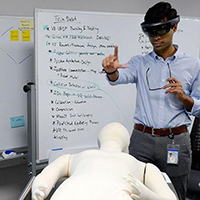 Young engineers have help as they start their careers at General Electric.
Young engineers have help as they start their careers at General Electric.
Formally and informally, mentorship and guidance are offered to the hundreds of engineers who join the company each year, with the goal of creating an atmosphere in which they can feel inspired and confident, rather than intimidated or overwhelmed.
Three young GE engineers spoke recently to The Daily Gazette about their experiences and ambitions, and about the idea of making their own way in a company with such an extensive history of invention and innovation. Each sees that legacy as an opportunity to excel, rather than a burden to live up to.
The engineers work at the GE Global Research Center in Niskayuna, and each is part of the Edison Engineering Development Program, a highly selective process that rotates new hires through three or more areas of research over the course of up to three years.
Jen Gavin, 25, an Orlando native who holds graduate and undergraduate degrees in mechanical engineering from Florida State University, set out to do “classical” mechanical engineering in her career — hands-on work with moving parts… Read More
Fog Computing Industry Forecast To 2022
Excerpted from SATPRNews Report by Sambit Kumar
 In this Global Fog Computing Market research report, the major driving factors of this market were identified and business associates and end-users were drawn-out.
In this Global Fog Computing Market research report, the major driving factors of this market were identified and business associates and end-users were drawn-out.
The structure of the business subdivision, outlines and challenges affecting the market across the world are also a part of this wide-ranging analysis.
Various discussions and talks were organized with the noticeable leaders of this organization to obtain unwavering and updated statistics with reference to the market.
This market research report looks into and examines the market and demonstrates a comprehensive assessment of its evolution and its specifications. Another aspect that was well-planned is the cost analysis of the main products leading in the Fog Computing Market bearing in mind the profit margin of manufacturers.
This Fog Computing market research report highlights on the major players in this market all over the world.
This segment of the report contains company synopsis, description and product representations, manufacturing capability, contact information, cost and revenue… Read More
Coming Events of Interest
IoT Solutions World Congress — October 3rd through 5th in Barcelona, Spain. This event has grown enormously in no time and is an excellent barometer and source of information, inspiration, collaboration and transformation.
2017 Storage Visions Conference — October 16th in Milpitas, CA. “New Visions for Digital Storage” will bring together the vendors, end-users, researchers, and visionaries who will meet the growing demand for digital storage for all aspects of unstructured and lightly structured data.
Mobility Unmanned — November 1st and 2nd in Washington, DC. Providing key stakeholders the unique opportunity to explore cutting-edge autonomous technology and examine the emerging regulatory landscape governing the commercial use of unmanned vehicles in all sectors – air, land, and sea.
Industrial Internet of Things (IoT) Europe — November 7th and 8th in Munich, Germany. IoT Europe will bring together forward-thinking companies from the manufacturing, energy, and transportation sectors to pave the way for the Industrial IoT revolution.
Government Video Expo & National Drone Show — November 28th through 30th in Washington, DC. The 22nd annual GVE will feature a full exhibit floor with numerous training options, free seminars, keynotes, networking opportunities, and five new educational pavilions.
Delivery of Things World 2018 — April 23rd and 24th in Berlin, Germany. Meet the most influential DevOps practitioners and experts and discuss what DevOps means for your business.
